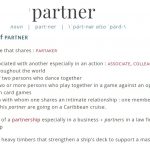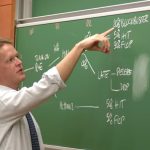Discussing case studies with classmates in the garden,”; “the fabulous views over Barcelona,”; “professors encouraging us to participate in class,”; “big challenges that we faced during two intense years,”; “the sunshine that gave us our daily dose of vitamin D.” These are some of the images that eight MBA alumni recall from their time at IESE. Each has a highly personalized view of a program that has now been running for 50 years. However, undertaking a two-year, Full Time MBA has made an impression on all of them. “You are who you are thanks to what you do, and IESE has played an important role in my life,” says Alejandro Beltrán (MBA ’98), managing director of McKinsey in Spain and Portugal.
Michael A. Di Santo (MBA ’88), general manager of the Royal Bank of Canada in Spain, agrees. “The program is very intense, both academically and personally, and very demanding at a mental and emotional level. It takes you out of your comfort zone and makes you question everything and makes you stronger,” he says. “It’s two years of intense experience at a high level of learning,” he adds. “Fight for what you want and never, ever quit” is the slogan he took away from the MBA.
Laurence Fontinoy (MBA ’02), marketing director at Google Spain and Portugal, recalls the first classes in which she wasn’t sure whether to take part or not and how she later changed her attitude. “You forget about being shy and simply do it.” For her this is part of the MBA’s legacy.
A focus on ethics
Fontinoy had considered other options before choosing IESE but seeing it for herself clinched it. “The moment I arrived on the Barcelona campus I knew I wanted to study there. I liked the way that people treated me, they were welcoming and open about the MBA,” she recalls, adding that all of this confirmed her preconceptions about school. “I had already worked with some IESE alumni and I liked the way they worked together and how they dealt with problems through teamwork, ethics and transparency.”
More than 10 years later, these same values were a key factor for Benjamin Givelet (MBA ’14), in-house strategy consultant at DSM. “During the selection process there was a presentation of Doing Good and Doing Well, the responsible business conference organized by IESE MBA students, and I thought: ‘this is a school I want to invest in and be a part of.’” His motivation was further reinforced by the academic focus. “Most of the case studies were handled from an ethical and sustainability point of view,” he says. Givelet, who recalls with pride the time when he took part in the organization of the 2014 Doing Good and Doing Well Conference, says that the two years in the MBA program allowed him to redefine his objectives. “Work for a company or for people you really believe in and whom you think it’s worth devoting your time to”.
María del Pino Velázquez (MBA ’91), chairman of the Unisono group, comments that “one of the aspects of IESE that I feel most proud of are our values.” The MBA is like a real-life laboratory of management but once they graduate, alumni face the challenge of incorporating what they’ve learned into their professional life.
One experience of Laurence Battaille (MBA ’95), founder and managing director at IPAC, illustrates this focus on people. Once she was involved in a collective decision about the future of a senior executive who was going through a difficult personal time. “I asked that we wait a couple of months to see if things improved because until then his professional performance had been excellent. I think we were right,” she says. “IESE teaches you to take better decisions and to always take the human factor into account.”
“This human touch is fundamental and when you meet other alumni, although you don’t know them, you feel a direct connection with them. I believe it’s the result of a culture that IESE was able to create and still maintains,” she says.
Paolo Venturini (MBA ’02), an Italian who works as director of Amazon’s distribution centers in the U.K., identifies a “common denominator” among the alumni of IESE that he now values as a recruiter. “One of the outstanding features of an IESE education is the graduates’ collaborative focus and teamwork mentality” , he believes. “They are different from those from other schools because they collaborate more, compete less with others – although they test themselves in order to improve – usually have their feet on the ground and try to enjoy what they’re doing.”
Values lie at the heart of the program’s success, according to Marta Ortega (MBA ’97), key clients Iberia at Deutsche Asset & Wealth Management (Deutsche Bank group). “The MBA is not based only on professional success. This comes because the IESE MBA is based on things that are much more profound. There are many professionals who have made the MBA something solid and lasting and these people base what they do every day on values and principles that go beyond the merely technical and academic.”
Like family
It’s the attitude of the professors that perhaps has made the greatest impact on the alumni. “I felt like I was with my family. You feel really close to the other students, to staff from the MBA office and the faculty. During my final week, I visited six professors, including Franz Heukamp, the director of the MBA programs, and each one of them opened their door to me. They gave me some really valuable feedback which I continue to take inspiration from” says Givelet.
Which professors made the biggest impact? The list of names and reasons is huge and includes exceptional teaching, personal support and a highly valued sense of humor. “We learned a lot but we also had fun because the professors give the courses, which are excellently prepared, in a dynamic and enthusiastic way and with a great sense of humor which really helps in the learning process,” says Battaille.
“I have ideas that I’ve recalled perfectly from classes that ended with a round of applause,” says Velázquez. “I recently bumped into Prof. Fernando Pereira and he recognized me. I was so moved,” she says. And it isn’t an isolated case. “I met Paco Iniesta on the plane. He was coming back from giving classes in Kenya when he recognized me and I thought, 14 years later and he still remembers,” says Fontinoy. The relationship with the professors may even develop into a close trust and friendship. This is what happened with Beltrán. “I have many friends from the program, including professors and people who are working in the school today,” he says.
Important lessons in leadership and focusing on programs
The type of relationship that the professors have with students imbues them with a certain model of leadership. “They teach you how people are important in everything to do with the company. Outside class, you understand that you motivate people through a genuine concern for the people around you,” says Beltrán. This view has been backed up by his extensive experience in consultancy. “When you analyze a person’s leadership abilities you see that it doesn’t just come from their ability to solve problems but from a human or relational component. You have to know how to give time to other people and to listen to them, and you learn this directly at IESE from the professors and from your experience. Above all, young people are inspired by someone close to them who shows an interest for them and tells them how to improve,” he says.
This understanding of leadership and personal interaction, which Beltrán believes is the most important thing that he got from the MBA, is of increasing importance to Velázquez. “Over time one of the things that has seemed to me most important is the management of people, leadership, even from the point of view of the administrative aspect of these questions. Sometimes I go over case studies and I think, what would Prof. Sandalio Gómez do in this situation?”
For Ortega, leadership ability is closely related to another benefit of the MBA: learning how to focus on problems. “The case-study method that IESE uses gives you a discipline for analyzing situations while evaluating all of the aspects and consequences. This has helped me to have a clear idea of how to focus in any circumstance, and to have my own opinion. I believe that this is part of what leadership consists of.” In her view, “you can take other opinions into account and be flexible but you have to know how to form your own opinion and have the discipline to apply what you believe is for the best, based on values.” In this respect, “the case-study method has always helped me,” she says.
Venturini also emphasizes the case-study method as the ideal way to adopt “a holistic focus when it comes to analyzing business problems.” This ability gives you “the confidence to deal with any business problem, knowing that you have 360-degree vision,” he claims.This approach to problems, in the words of Beltrán, “as a complete way, understanding and incorporating every perspective,” made a big impact on Velázquez. “For me, as a mathematician, I could see that there isn’t a single answer to business problems and this is perhaps the best lesson I learned from the MBA,” she says.
But as the founder of Unisono, a company that finds technological solutions, the MBA also opened up new professional paths. “If it wasn’t for this education I wouldn’t have established my own business. It awoke something inside me and for the past 15 years I’ve been running the company that I created. I’ve realized my dream,” she says.
A mark of quality
When Givelet gives an MBA candidate advice he tells them: “It’s a once-in-a-lifetime opportunity to reach new heights in your career. The MBA program acts as a transformational journey and therefore I think the two-year format better suits career changers. Considering the significant investment in time and money one is making, it is worth opting for an MBA program that is globally recognized as one of the top ten, and is excellent in business ethics.”
“I would without hesitation recommend the MBA, as well as the AMP that I did in 2014,” says Battaille. “I’m proud of the school because IESE’s programs are of such high quality.” Even Velázquez’s daughters have heard about it. “I’m always on at them to do an IESE MBA, ”she admits. “You need education but it has to have value. For years IESE has been among the top ten business schools in the world. Others rise and fall but IESE stays up there,” she says, adding that it’s why she has no doubt about recommending it. “When people ask me for advice I want them too to have something on their CV that we know will have the same essence, and that will always be prestigious.”
“An IESE MBA is a seal of approval” , says Di Santo. “It shows you’ve studied hard and you’ve achieved something difficult and that will help you from that moment on. Furthermore, it’s recognized worldwide.”The whole World in a classroom
“IESE enabled me to have an international career,” says Venturini. A key element of the IESE MBA is the presence in the classroom of students from numerous countries, 56 in the current cohort . “It opens your mind. It gave me the tools to face cross-cultural communication and to successfully work in an international environment,” he says.
The program was originally given in Spanish, then bilingually after 1980 and now in English. Ortega wanted to acquire international experience and when she discovered she could study at IESE in English, she jumped at the chance. “The international aspect was one of the key reasons that I came to the school,” she says. “It was the first place I’ve been where your place of origin was of no importance because we were trying to achieve common objectives. This has helped me a lot in my career, which has taken me halfway around the world.”
However, this diversity in the classroom is not only useful when it comes to working in other countries. “One of the benefits is being among different people with very diverse careers and lifestyles. This helps you to see things from a different point of view and to understand that the people around you may see things differently,” says Beltrán.
Givelet agrees. “Being a French national with 7 years’ experience in operations and having a family of 5, I could hardly find anyone with the same profile than me. I believe that IESE is making a special effort to increase diversity, not just geographical but also in professional background, personal lifestyle and gender. It made a huge impression on me being with this range of bright people.”
Colleagues, the friends for life
When the MBA graduates leave the campus clutching their diplomas they don’t do so alone. During those two years at the school they have created personal relationships that they can count on from now on, as well as having many professional contacts. “The MBA opened many doors. When you leave you become part of the fabric of IESE business people and professionals, both from your own class and from others,” says Di Santo. This has also been Fontinoy’s experience. “I have come to know many IESE alumni in important positions, both in my previous job and where I work now, and they have supplied me with good professional contacts.”
Furthermore, the intense experiences shared over a period of two years form the basis of deep friendships that survive over time and distance. “I have friends all around the world. When you go to a wedding, you realize what a huge number of nationalities are represented,” says Fontinoy.
Venturini believes that one of the main benefits of the program is to have “an incredible network of friendships around the world. They have become the most numerous group of friends in my personal network and I regularly see some former classmates, some on a weekly basis,” he says.
These friendships are what alumni cite as among the most precious things that acquire from the MBA. As well as highlighting the range of nationalities, they also talk about how extensive this personal network is and the solidity of the friendships. Di Santo graduated 27 years ago and says that “there are still some 50 classmates with whom I’m in touch by mail. We talk about important events and try to see each other at weddings or alumni meetings. On the 25th anniversary of our graduation, 85 of us met. And it’s extraordinary because they come from all over the world: from California, northern Europe, Japan, Zimbabwe, Venezuela…”
This combination of experiences, lessons and values make the IESE MBA something that gets under the graduates’ skin . As Battaille says: “It’s amazing to spend two years with colleagues from 23 countries. The quality of the classes is incredible, the best learning experience I’ve ever had. The MBA has been a memorable journey.”This article was originally published on the Alumni magazine.










